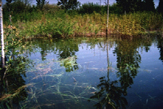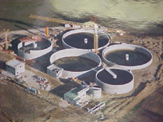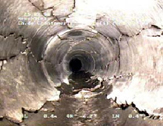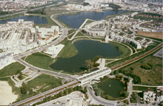 |
 |
 |
 |
 |
 |
 |
 |
 |
 |
 |
Important issues
A series of important issues have been raised throughout the duration of the PETUS project through the case studies and the stakeholders meetings, including issues remaining and new problems..
For more information: "important sector issues"
i) The water resource quality and availability.
This issue is directly linked with the aquatic ecosystems management and is reinforced by the European Framework Directive 2000/60/CE which advocates that "Water is not a commercial product like any other but, rather, a heritage which must be protected, defended and treated as such". This directive recognises the need for action to avoid long term deterioration of freshwater quality and quantity and called for a programme of actions aiming at sustainable management and protection of freshwater resources.
Problems are:

- the deteriorating quality of water drained from urban areas: urban storm water pollution is difficult to quantify and control, and often contributes to the
long term chronic degradation of the rivers, lakes and reservoirs, into which these drainage system discharge,
- water shortages: due to pollution and water over extraction. Many strategies are possible as response: pollution restriction, water consumption reduction and savings, water purification…
- the lack of new means for collaboration between the several actors involved in the groundwater management. These new methods should make it clearer where the best chances are for sustainable changes,
For more information: "water supply in Copenhagen"
ii) The Management and conception of urban water infrastructure.
Urban water can be seen at the same time as a resource (drinking water, water processes)
and a threat (flooding, sanitation risks). We can consider 3 kinds of infrastructures used in urban area: transport and treatment of waste water, storm water management and drinking water production and distribution.
Problems are:

- to find adequate tools to choose between several possible alternatives of new water urban infrastructures (evaluation and comparison)
- ageing of infrastructure and their deteriorating performance are increasingly recognised. And challenges call for new planning methods to invest the limited funds in such a way that for example the right pipe is rehabilitated in the right time with the right method

- operation of existing urban waste water systems. Examples include impaired performance of waste water treatment plants resulting from rapid changes in
the inflows of storm water and the continuing introduction of new synthetic organic compounds, which enter the drainage system; constraints on urban growth caused by inadequate drainage infrastructure, and ageing sewer systems requiring costly rehabilitation.
For more information: "urban storm water management and sustainability"
iii) Water management at the city scale.
The problem deals with projects concerned by the necessity of combining water cycle and urban system. In many situations, solutions can not be achieved without thinking in a more global way at the whole
urbanisation. Relevant technical solutions are often easier to find if on one hand water management system is integrated from the beginning of the project
and on the other if their implementation is following up at each stage of planned development. The new conception of water management advocates thinking about solving problems not in terms of "sewerage" or "water supply" but in terms of "management of the urban part of the water cycle".
Challenges are:

- The insertion sustainable elements and recommendations on water planning documents
(water master plan)? This problem appears as crucial for the following decades because of legislation requirement. Indeed, the Water Framework Directive imposes to "achieve a good status" of all the waters considered (surface water, groundwater, transitional waters…) before 2015 and it imposes also to implement a "river basin management plan" before 2009.
- To take into account in a better way the water management in the land planning documents